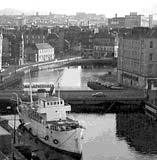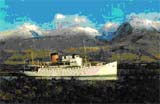|
Edinburgh Today - Cruise Ship 'Ocean Mist' |
|
Captain W H Hume The steamer, 'Ocean Mist' was built in 1919 by George Brown & Co, Greenock. It was originally named 'Samuel Green' and was built for the Navy, but the 1st World War was over by the time it was completed, so it was sold as a yacht. This narrative is an extract from a paper of maritime historical into the background of British Steam Trawlers, circa 1870-1970, compiled by Captain W. L. Hume, M.N.I.. The paper deals with one particular vessel - Ocean Mist. Walter L Hume served as Chief Officer for some time on board this vessel, which was built during the period of the first world war as part of an Admiralty program to replace the large number of minesweeper losses, most of which had been commercial fishing trawlers at the out break of war in 1914. Requisition of Fishing Boats by the Royal Navy As far back as 1907 the Admiralty realised that fishing trawlers were ideally suited to be adapted as mine sweepers with minimal alteration being necessary, equally the fishing crew-members, well accustomed to handling similar type of gear became the obvious choice of operating personnel. During the quiet period between 1907 and 1914 fifteen or so, commercial trawlers of varying sizes and age were purchased by the Royal Navy and adapted to become mine sweepers, after much trial and error a reasonable system was introduced and fishermen were encouraged to join the new Auxiliary Patrol Service - similar to the Territorial Army. When the war did start many of these fishermen immediately commenced mine-sweeping duties, often on the ships they had been fishing on shortly before. These commercial trawlers were hurriedly requisitioned and converted to suit the Royal Navy requirements for the dangerous task of sweeping mines laid by the German Navy. More Commercial Trawlers Needed By 1916 it became obvious to the Admiralty that no additional further commercial trawlers were being replaced for the vast number of mine sweeper losses. It therefore became an urgent priority, resulting contracts were placed with many recognised shipyards throughout the U.K., in addition to smaller firms with little or no experience, and ordered commencing construction as soon as practicable.
|
|
Leith - 1980s In the mid-1980s, 'Ocean Mist' came to Leith. It was moored on the Water of Leith, at The Shore and used as a floating restaurant, until it closed in 2000.
Ocean Mist -
|
|
Conversion to Offices - 2005 Over the next year, from March 2005, 'Ocean Mist' is to undergo a £500,000 refit to be converted into a floating shops and offices. It will then be moored alongside specially-built barges at The Shore Herald & Post: March 17, 2005, p.21 |
Conversion to Restaurant - 2005 The owners of 'Ocean Mist' - 'Water of Leith 2000' - began restoring the ship in March 2005 but, four months later, they announced revised plans. Instead of converting the ship to offices, they now plan to sell it to a company that has approached them wishing to convert the ship into a 'very special' restaurant with conference facilities. Edinburgh Evening News: July 25, 2005, p.4. |
|
Conversion to Piano Bar - 2007 Edinburgh Evening News announced on November 24, 2006: "Ocean Mist, a cruise ship once owned by the Guinness family is set to begin a new life within days as a piano bar, nightclub and restaurant complex called Cruz." Edinburgh Evening News: November 24, 2007, p.27. 'Ocean Mist' became 'Cruz' on February 8, 2007. - The ship now has a new top deck and restaurant. - Downstairs are what are described ad 'an ultra-modern white lounge' and 'an intimate dark piano bar.' February 10, 2007: p.13 |
|
Ocean Mist |
|
Please click on the image below to read some background research on 'Ocean Mist' , compiled by Captain Walter Lyle Hume who served as Chief Officer for some time on board this vessel.
Ocean Mist sailing |
|
TRANSPORT |
|||||||
| Full Index |
Bus Tickets |
Railway Tickets |
|||||

